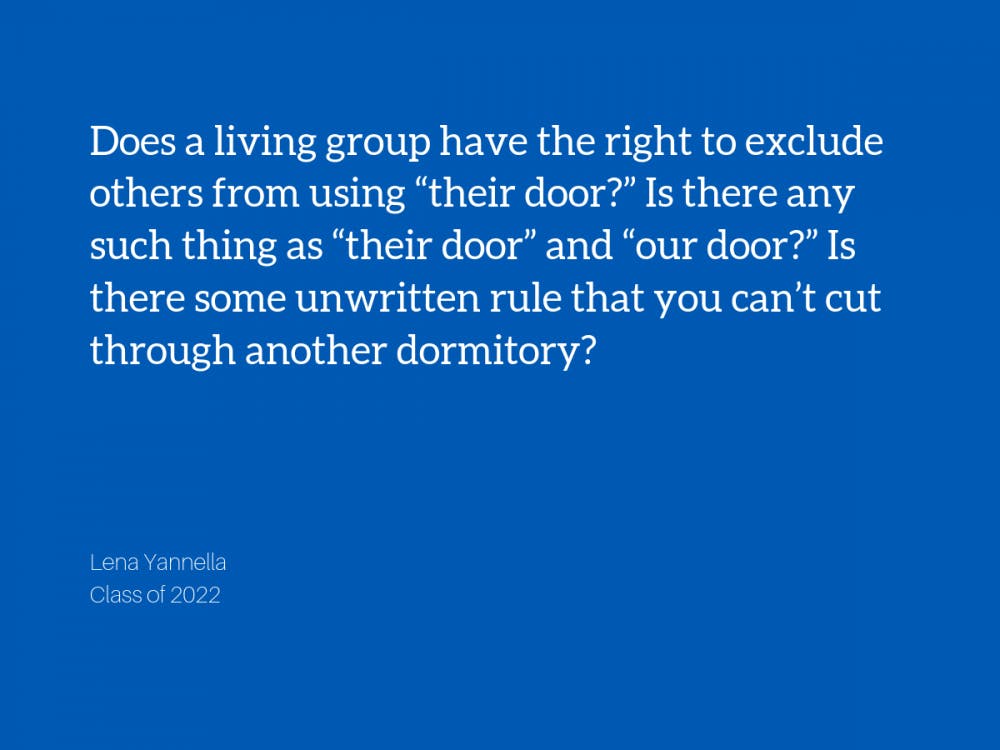Dear Unlicensed Ethicist: While returning to my dorm last Friday, I was intimidated from taking the most direct route, which involved using the door of a “selective living group,” because the last time I dared use their hallway, a student barked at me. Yes, barked... as in like a dog. Plus, she hung obnoxious signs. How should I react? Should I bark back?
Valued reader,
Yes, it is okay to bark back. But it depends on your barking abilities. Practice in the shower to gauge if your bark is louder than hers. When going canine, it’s best to be dominant.
But while a single bark may be a humorous way to defuse the situation, it is not necessarily the best course of action. It’s worth analyzing why she feels compelled to bark. Have you checked for any correlation with the lunar cycle?
Perhaps this is a twenty-first century expression of ennui. Sort of like Gregor Samsa, the stressed out salesman who awoke one day to find himself transformed into an insect. Except in this case, the stress of being a Duke student has transformed and deprived her of the ability to speak. But what are the chances of that? Slim to none. There is a reason that “The Metamorphosis” is classified as fiction.
All kidding aside, maybe this bark is a message. Not the most eloquent one, but a message nonetheless.
The easiest course of action would be to report it to Housing and Residence Life (HRL) and ask them to sort it out. They’ve been dealing with problems like this for decades and likely have seen similar cases in the past. But is their intervention necessary? Absolutely not. This is a life lesson, one that students are entirely capable of resolving on their own. After all, we are adults... more or less.
So is this a valid territorial issue? Does a living group have the right to exclude others from using “their door?” Is there any such thing as “their door” and “our door?” Is there some unwritten rule that you can’t cut through another dormitory? Does it matter which dormitory? Does an individual student have the right to harass a passerby? The answer to all these questions is a resounding no.
Does this neighboring dormitory, which shall remain unnamed, get a pass because it belongs to a selective living group? One can’t help but think that if a fraternity brother stood sentry at a door and barked at “non-brothers,” it would become a scandal, especially if he did it with some regularity during daylight hours. Even if the fraternity didn’t ask the brother to bark, the organization would be censured for not keeping him on a tighter leash. If one fraternity brother misbehaves, the stigma has a way of spilling over onto everyone. That is reality, even if it’s not entirely fair. The selective living group may want to keep this in mind and have a “talk” with their barker.
As Duke students with diverse interests and a multitude of organizations to join, it may be tempting to divide ourselves into insular cliques. But it is best to resist the unhealthy urge to label and judge each other by stereotypes. It creates a poisonous atmosphere, one that is not conducive to learning and personal growth. When encountering someone from a different organization or living group, view it as an opportunity to enrich yourself rather than to exclude.
So how should one respond to a barking neighbor? Reach out. Build a relationship. Maybe even toss them a tasty bone. If the urge to bark proves to be irresistible, bark in unison rather than at each other. The quad will be a better place.
Lena Yannella is a Trinity sophomore. Her column "the unlicensed ethicist" typically runs on alternate Tuesdays.
Get The Chronicle straight to your inbox
Signup for our weekly newsletter. Cancel at any time.

